
YOUNG ENTREPRENEURSHIP AWARD 2017

YOUNG ENTREPRENEURSHIP AWARD 2017
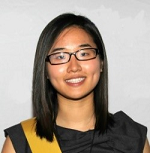 Ms. Kathy Ku, Co-founder, SPOUTS of Water (Uganda), USA
Ms. Kathy Ku, Co-founder, SPOUTS of Water (Uganda), USA
“SPOUTS of Water”
In Uganda, more children die of water diseases than either malaria or AIDS. While studying engineering at Harvard University, Ms. Kathy Ku homestayed in Uganda and experienced sickness from drinking water. After her return to USA, she designed an inexpensive ceramic filter to be used by households in Uganda. The ceramic filter can be manufactured by molding and drying a mixture of clay and sand in Uganda. After she graduated from Harvard, Ms. Ku moved with her partner to Uganda, co-founded a company, SPOUTS of Water, and started pilot production of the ceramic filter in 2012. They have confirmed that the ceramic filter can remove 99.9% of bacteria. The company started sales of the ceramic filter with the brand name Purifaaya in 2015. The household cost for using the ceramic filter is about 20 US dollars for two years. Sales have been constantly increasing and reached 185,000 US dollars in 2016. The company built a new factory in April 2017, and the production capacity has increased to four times that produced at the first factory. They anticipate sales of 910,000 US dollars in 2019. They are also developing human resources who can manage the company in the future. The Foundation recognizes a significant contribution to addressing water problems in Uganda and gives the Best Entrepreneur Award to Ms. Kathy Ku.
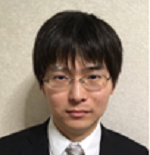 Mr. Koki Sano, School of Engineering, the University of Tokyo, Japan
“Development of a dynamic photonic crystal based on inorganic nanosheets”
Mr. Koki Sano, School of Engineering, the University of Tokyo, Japan
“Development of a dynamic photonic crystal based on inorganic nanosheets”
Tropical fish, such as the Blue Damselfish and neon-tetra, have a photonic crystal composed of cofacially oriented guanine sheets in their fluid cytoplasm, and can freely modulate their structural colors by dynamically controlling their nanostructures. If such a dynamic photonic crystal can be artificially synthesized, it is expected to become versatile tool for the control of light. However, practically it has been difficult to develop such a dynamic photonic crystal. Mr. Sano has found that titania nanosheets with a negative charge can spontaneously form long-range periodic structures by simple deionization, and succeeded in developing a dynamic photonic crystal. The photonic crystal that Mr. Sano has developed can freely display various colors by changing the temperature, pH and magnetic fields.
The photonic crystal that Mr. Sano has developed is recognized as a basictechnology in the field of photonic crystals, and industry expects his method to be one of the next generation of color tools. He is collaborating with industry to develop a biomedical sensor and a wavelength tunable laser. The Foundation recognizes its fundamental importance for color technology and has decided to give the Selection Committee Special Award to Mr. Koki Sano.
 Mr. Ammishaddai Ofori, Co-founder and CEO, Flippy Campas, Ghana
“Flippy Campus”
Mr. Ammishaddai Ofori, Co-founder and CEO, Flippy Campas, Ghana
“Flippy Campus”
Flippy Campus started as an information sharing website for students in Ghana, with which they can get timely information about class and test schedules. Mr. Ammishaddai Ofori and his partner gradually developed various services for Flippy Campus using Amazon Cloud service (AWS). For instance, they developed an avenue service with which students exchange messages such as on FaceBook. Now, Flippy Campus has become a multifunctional network with which students share information, university staff counsel students, and students share teaching materials. Recently they have added an online shopping service with which students can buy necessary goods such as soft drinks and deck shoes at discount prices. Android, iOS, and Web application versions are now available. They started the service in 2015, and continue to add necessary services for students. The number of users is steadily increasing, and the monthly users reached 290,000 in 48 universities in July, 2017. They are planning to expand the service to universities in Nigeria and Kenya. The Foundation recognizes his significant contribution to the development a multifunctional student network, and gives the Entrepreneur Award to Mr. Ammishaddai Ofori.
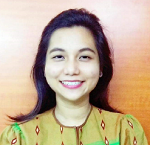 Ms. Nilar Myint, Project Leader, For Her Myanmar, Myanmar
“For Her Myanmar”
Ms. Nilar Myint, Project Leader, For Her Myanmar, Myanmar
“For Her Myanmar”
In 2016 Myanmar became a democratic nation after 60 years of rule by a military administration, and Myanmar women are experiencing totally new situations different from their thousand year old traditional roles. Believing that knowledge is power, Ms. Nilar Myint started a new FaceBook page, “For Her Myanmar”, to transmit various forms of information to Myanmar women in 2016. Now 15 passionate amateur writers with journalism educations have joined the For Her Myanmar team, and the FaceBook page reached 380,000 followers in 2016.
For Her Myanmar posts on various topics including book reviews, career information, cosmetics, psychology, and news for women. Each month they receive about 500 US dollars worth of advertising revenue. They maintain a transparent policy in revealing supporter names when they receive money; they write what they believe is good for readers. They have various activities including setting an independent website for Myanmar women, forming a paid membership community, and developing TV programs. The Foundation recognizes her place at the forefront of women’s journalism in Myanmar, and gives the Entrepreneur Award to Ms. Nilar Myint for her achievement.
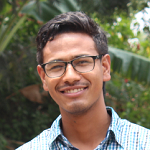 Mr. Nishan Chandi Shrestha, Managing Director, ECO CELL INDUSTRIES, Nepal
“Eco Cell”
Mr. Nishan Chandi Shrestha, Managing Director, ECO CELL INDUSTRIES, Nepal
“Eco Cell”
Nepal suffered major damage when a strong earthquake hit the country in 2015. Seven hundred thousand houses were damaged leaving 3.5 million people homeless. It has become an urgent issue to provide construction materials to build earthquake-proof houses, and Mr. Shrestha decided to provide low cost and earthquake-resilient constructing materials. He has introduced manufacturing technology of interlocking bricks from India, and established a company, Eco Cell Industries, to produce interlocking bricks 5 months after the earthquake. Interlocking bricks can be produced by pressing soil, sand and 10% cement with a pressing machine and curing the bricks for 21 days. The production does not require heat drying as used for producing usual bricks thus saving energy. The company not only produces the interlocking bricks but also builds houses with them. He also promotes the technology by training NGO, start-up companies, and individuals. The company has built 21 houses and one school in 6 areas, and created employment for 70 people. The Takeda Foundation recognizes his achievement and efforts and gives the Entrepreneur Award to Mr. NIsahan Chandi Shrestha.
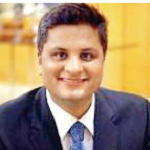 Mr. Vaibhav Lodha, Co-founder and Chief Business Officer, Nomisma Mobile Solutions, India
“ftcash”
Mr. Vaibhav Lodha, Co-founder and Chief Business Officer, Nomisma Mobile Solutions, India
“ftcash”
India has 55 million small scale merchants, and currently, these merchants have no alternatives to accepting cash. Most of these merchants cannot afford a POS machine due to the upfront cost and additional infrastructure requirement. “ftcash (faster than cash)” provides cash-less transactions for small scale merchants who do not have digital payment systems. It receives online payments from customers at its bank account, and transfers money to merchants’ accounts with detailed information about the transactions. Mr. Vaibhav Lodha started the project with 300 small scale merchants in Mumbai showing them that they could actually receive payments at their own bank accounts, and rapidly increased the number of ftcash users. Today, ftcash has over 30,000 small scale merchant users, transacting over USD 80 million yearly. ftcash has grown 100 times in the last 18 months.
“ftcash” provides a solution for small scale merchants who can’t receive online payments, and has opened a door to the net economy for small scale merchants in India. The Foundation recognizes his achievement and efforts, and gives the Entrepreneur Award to Mr. Vaibhav Lodha.